
-------------------------------------------------

-------------------------------------------------
Coast Women in Development (CWID)
Annual Progress report
April 2010 – March 2011
TABLE OF CONTENTS
Executive Summary
About CWID
Introduction and Background
Mission
Vision
Strategic Objectives
Projects
Activities
Grassroots women economic empowerment program
International Day for Action on Women’s Health
Civic education on constitution
People with disability and TJRC Forum
Presentation on Commercial Sex Exploitation in Children
Community and members capacity building
Dissemination of AIDS Indicator Survey
Volunteers and Interns
Empowering girl child Education
16 Days of Activism
Community Outreach
Training on governance and Devolved Government
Lobbying and advocacy
Media Engagement Campaign
Goat –rearing Project
Increased opportunities for women leadership
International Women’s Day
Peaceful Demonstration on escalating fuel and food prices
Successes
Challenges
Partnering
ABBREVIATION
AIDS – Acquired Immune Deficiency Syndrome
APSA – American Political Science Association
CDF - Constituency Development Funds
CSEC – Commercial Sexual Exploitation of Children
CBO – Community Based Organization
CSO- Civil Society Organization
CWID – Coast Women in Development
FBO – Faith Based Organization
GBV – Gender Based Violence
HIV – Human Immunodeficiency Virus
ICRHK – International Centre for Reproductive Health
IHRD - International Human Rights Day
KECOSCE – Kenya Community Support Centre
KICODI - Kisauni Constituency Development Initiative
MUHURI- Muslims for Human Rights
NGO – Non Governmental Organization
PC - Provisional Commissioner
PGBV - Pwani GBV Network
PLWD – People Living With Disabilities
SAVEDA - Saved Charity Savings (Children’s Home)
SRA - Support Request Application
TJRC – Truth Justice and Reconciliation Commission
USA - United States of America
USD - United States Dollar
VCT – Voluntary Counseling and Testing
WOFAK - Women Fighting AIDS in Kenya
EXECUTIVE SUMMARY
This report entails the Coast Women in Development’s efforts that have been undertaken for a period between April 2010 and March 2011. CWID is a non-governmental organization in the Coastal region of Kenya that was established in 2006. The organization’s main niche is empowering women especially the women at the grassroots level. CWID’s main goal therefore, is to enhance support to development activities of its structural members who are currently seven hundred and twenty in number, well spread all over the coastal region. Volunteering spirit is central to Coast Women in Development’s dispensation of her core responsibilities and activities that aim to promote the poor women involvement and participation.
This reporting period proved critical to our country in that we were able to pass a new constitution that will change the course of governance in our country. Coast Women in Development has been in the forefront in the fight against gender based violence and economic demeaning. There was a drastic improvement on men who report cases of GBV from 17% last year to 38% this year.
In this period CWID received a milestone when it was recognized by the Committee of Experts and was handed a certificate for the splendid job of civic education creating awareness and building capacities of the mwananchi. It is also a period that had the organization being awarded the best civil society of the year during the commemoration of International Human Rights Day (IHRD) held on 10th December 2010.
Inadequate resources continued posing a challenge to the organization making it difficult to undertake some of our mandate responsibilities.
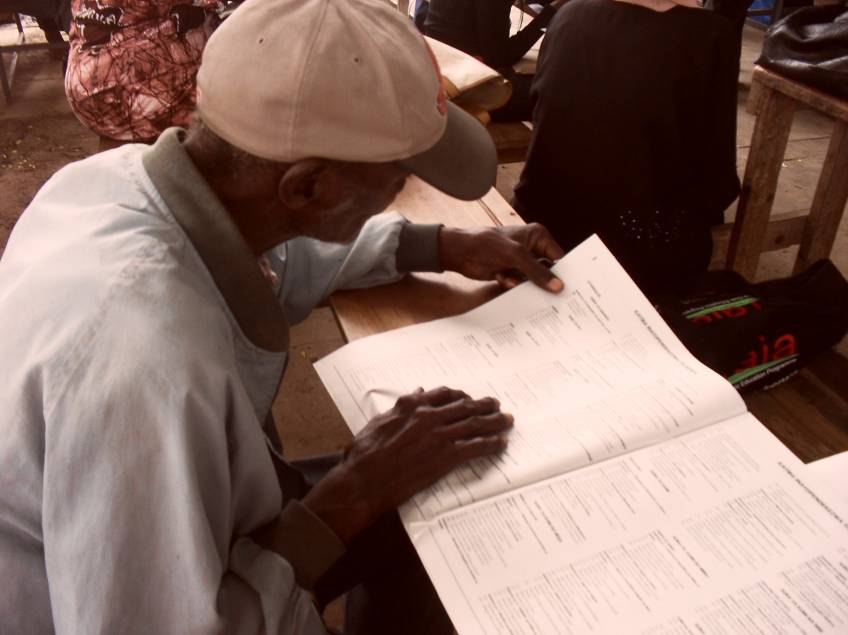
ABOUT CWID
Coast Women in Development (CWID) is a registered and independent, non profit making women organization with complex objectives on women and children issues. The organization was established in the year 2006 to identify and reinforce women’s role in leadership development and good governance. The organization in addition, serves as the secretariat to the Pwani Gender Based Violence Network, which is a group effort of the various organizations addressing issues of gender in general and gender based violence in particular at the Coastal Region of Kenya in collaboration with National Commission on Gender and Development.
The organization undertakes key activities in capacity building, development of income generating projects, HIV/AIDS programs, nutrition projects, Girl Child Empowerment and advocacy on women and children rights in order to empower women and reinforce their roles and position in the country’s socio-economic and leadership platforms. The activities are:
CWID pays attention to the impact of GBV, gender equality, individual’s sexual and reproductive health -especially regarding limited access to sexual and reproductive health services of vulnerable grass root women. CWID therefore seeks to improve the contribution of both men and women in awareness/prevention of GBV and in defense of their sexual and reproductive health by involving the whole community in finding solutions to problems thus involving them and making the community to practice responsibility and empowering women to make decisions that do not violate their rights.
CWID is committed to the empowerment of the disadvantaged groups such as vulnerable grassroots women, the community from informal settlement, widows and orphans-by providing for them with the knowledge and molding them to their means of conversant and responsible decision making standard. This is concerning economical rights e.g. through micro credit project to the widows and to the poor grass root women as well as edifying support for the orphans.
CWID ensures excellence in her community work by involving the community, the administrations, networks and leaders through using standardized and innovative methodologies for achieving her goals in the most efficient ways without compromising the equality of work.
The organization’s main niche is empowering women especially the disadvantaged ones. It’s our belief that investing in grassroots women supports not only the women, but the whole community as well. Grassroots women are often neglected in development work as many organizations find it difficult to venture out to rural areas, this is in addition to the fact that their husbands migrate to urban centers to look for greener pastures leaving them to look after their families on their own, most of these husbands do not send money back home either because of lack of employment or indulgence in irresponsible practices.
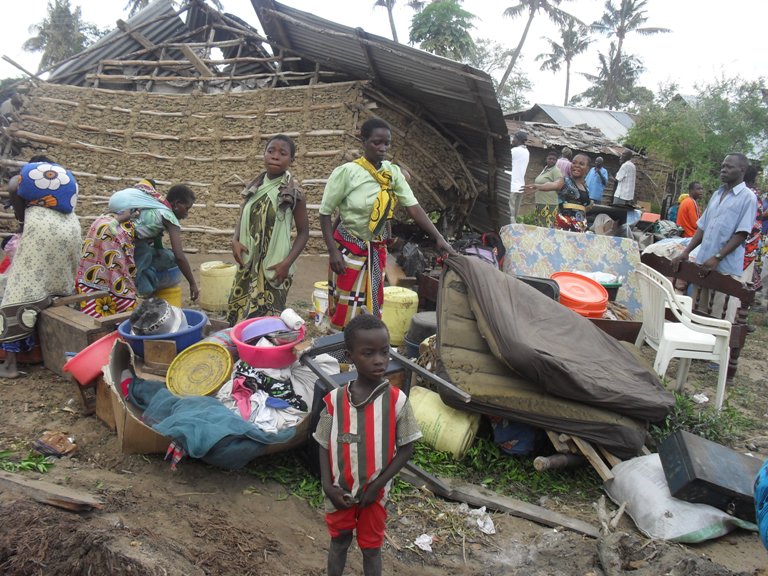
Volunteering spirit is central to Coast Women in Development’s dispensation of her core responsibilities and activities that aim to promote poor women involvement and participation in overcoming women suffering brought about by violence, diseases, poverty and hunger. The organization affirms the importance of women rights, their capabilities in bringing change to the society through their combined effort.
CWID is active in different sectors of the society to improve the livelihoods of the community. It focuses its attention to education, organization and prevention.
CWID’s main goal therefore, is to enhance support to development activities of its structural members, who are well spread all over the coastal region of Kenya. The organization’s mission is to create an inspiration of forming a base for the social movement that is able to give positive direction to women at large and the youths.
Coast Women in Development (CWID) recognizes that rural women are the most vulnerable to climate changes. The husbands of these women go to the urban areas in search for employment leaving them behind, incase of climate change disaster, women and children are forced to relocate to the nearest safe places. Children are forced out of school until they are safely settled. During this period the women and children are prone to waterborne diseases and famine. It is through these occurrences that CWID has been holding the government accountable through petition
INTRODUCTION AND BACKGROUND
This report covers the period between April 2010 and March 2011. It is a period that proved critical to our country in that we were able to pass a new constitution that will change the course of governance in our country. As an organization we appreciate that lots of the gains that we have been fighting for on women rights were hugely incorporated in the new supreme document and if implemented will formulate and realize gender –sensitive, national and economical policies that will assist the society in resisting acts that lead to women economical exploitation. The policies will also be able to deal with harmful traditional practices and their impacts on women and therefore promote the value of women as human beings, consequently aid the women in enjoying rights without any kind of discrimination.
We are however cognizant that the struggle is not over since there are still individuals and prophets of doom that are hell-bent in derailing the implementation process. There is still a gap on the education and creation of awareness on the document.
The prevalence rate of GBV, HIV/AIDS and drug abuse is high in Coastal region owing to the fact that there are many slums in Kisauni plus the robust tourism industry. Coast Women in Development programs have been aimed at raising people’s level of awareness and understanding of these issues. In the past, AIDS was associated with witchcraft and poverty. Drug abuse is attributed to poor attitude of parents towards education, unemployment, poverty and stigma.
CWID has also been using theatre and songs by youths and women groups to sensitize the community on how drug abuse contributes to GBV and HIV/AIDS.This report chronicles the process and struggle we used in achieving these successes.
MISSION
To identify and reinforce women’s role in education, leadership and development.
VISION
An improved life to the vulnerable women and children, living at the grassroots level with enhanced support to development activities.
STRATEGIC OBJECTIVES
In order to achieve its goals, CWID has five strategic objectives which guides the organizations in undertaking its activities. The following are the strategic objectives as outlined:
To improve the contribution of both men and women in awareness and prevention of GBV and their sexual and reproductive health by involving the whole community in finding solutions for the problems and by empowering women to take part in decision making concerning their rights.
To pay attention to the impacts of Gender Based Violence (GBV) and gender inequality on individual’s sexual and reproductive health, especially in regard to limited access of vulnerable grass root women to sexual and reproductive health services.
To empower the disadvantaged groups such as vulnerable grassroots women, the community in informal settlements, widows and orphans, by providing them with the means of making conversant decisions concerning economical rights, through Micro-credit Projects offered to the widows and to the poor of the poorest grass root women, as well as edifying support for the orphans.
To ensure excellence in community work by involving the community, the administration, networks and leaders through using a standardized and innovative methodology for achieving her goals in the most efficient ways without compromising the quality of work.
To network with other stakeholders in the campaign for a policy that improves the budget for a better healthcare and decreased maternal and infant mortality.
PROJECTS
The organization had six running programmes during this period of reporting
Campaign on Non-Violence and fight against Malaria; the project targets to empower the community with skills and resources of controlling and preventing the spread of Malaria and its impacts.
Prevention and awareness of gender based violence in the Coastal region. This is done in collaboration with Pwani GBV network.
Economic Empowerment - through Microfinance loaning Scheme- this project supports members in designing small projects and advancing small start up loans which payable within a period is ranging from one to three years, E.g. Goat rearing project in Kilifi and Malindi.
Improved hygiene and sanitation in slums; in this project, women and youths are trained in observing household hygiene. This is also done to promote HIV/AIDS awareness activities at the household levels.
Education support for girls in poor families; this project identifies bright girls from poor families within the neighborhoods from where CWID has membership of projects, offer support by facilitating them to continue with schooling without interruption which is often occasioned by poverty or lack of resources. CWID approaches this by sending Support Request Application (SRA) to government run bursary funds, constituency Development Funds (CDF) donors, individuals and corporate well wishers
Healthy Action Campaign, The project advocates for the government health strategies to address the needs of poor people in order for the MDGs to be met as well as the demand of development strategies. This we do in partnership with FHOK, Kwetu Training Centre and MTG under the umbrella of DSW and IED.
ACTIVITIES
In this reporting year CWID undertook various activities as part of realizing its objectives. While some of the activities were planned some were impromptu which came about with new development and challenges that affected the community and needed to be addressed urgently. The following chronicles the activity that we have highlighted as part of our effort.
Grassroots women Economic Empowerment program
Investing in grassroots women supports not only a woman, but sustains a community. Grassroots women are often neglected in most development work as many organizations find it difficult to venture out to rural areas. Despite the fact that these same women play a greater role of taking care of their families while some of their husbands migrate to urban centers to search for jobs. Other men indulge themselves in irresponsible practices such as over-drinking thus forgetting their paternal responsibilities towards their own families.

Furaha Women Group members registering for the microcredit loan
CWID has a micro-credit project that targets the poor of the poorest. The micro-credit project has enhanced the lives of most women living at the grassroots level by running small scale businesses that sustain their livelihood. This has also empowered the women economically.
“Since l started getting my loan from CWID my children can now afford to eat a balanced diet and for those who go to school, they are able to have books and school uniform too. The money has not only shaped my business but it has also changed the livelihood of my family members,” says Zawadi a mother of four children.
CWID believes that reaching out to grassroots women is one of the best investments and is proud to support the work of grassroots women.
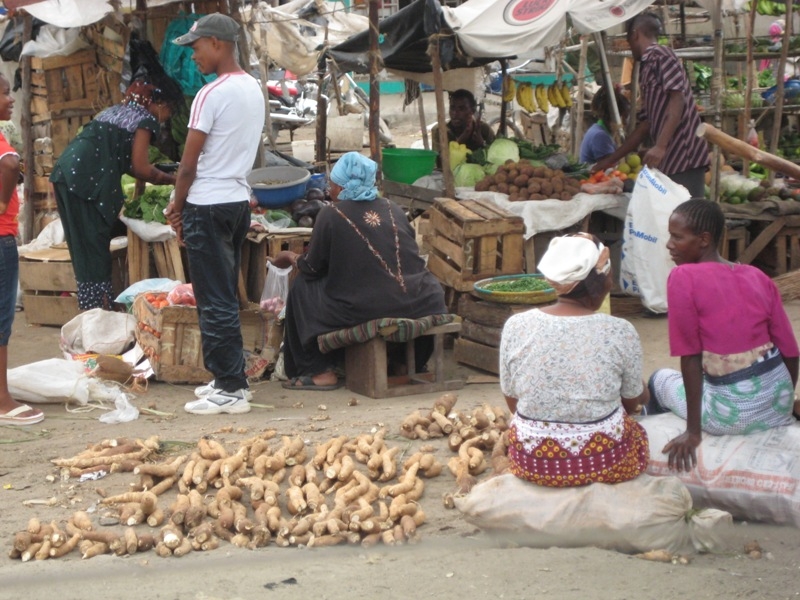
Beneficiaries of micro-credit loan at Matano Manne market selling their wares
Gender Based Violence (GBV) intervention
Gender Based Violence is an issue that has been occurring in most homesteads daily but dealing with it is what has been a problem. Pwani GBV network has been in the forefront to create awareness to prevent GBV in Coast Province.
As an organization we received 174 cases of gender based violence during this reporting period. Women still made a bulk of these cases when they posted 68% while their male counterparts were 32%. It is worth noting that the percentage of men has increased from a paltry 17% the previous year to 38% this reporting year. This we attributed to the massive campaign that we and other like minded organizations from the Pwani GBV Network (PGBV) have been undertaking to enlighten men on the need of coming out to speak.
Coast Women in Development is the secretariat of Pwani GBV network and has ever since been holding the flag high. The network uses the skills they acquired from the trainings that were convened and facilitated by Mr. Muchella, who was then from National Commission of Gender and Development.
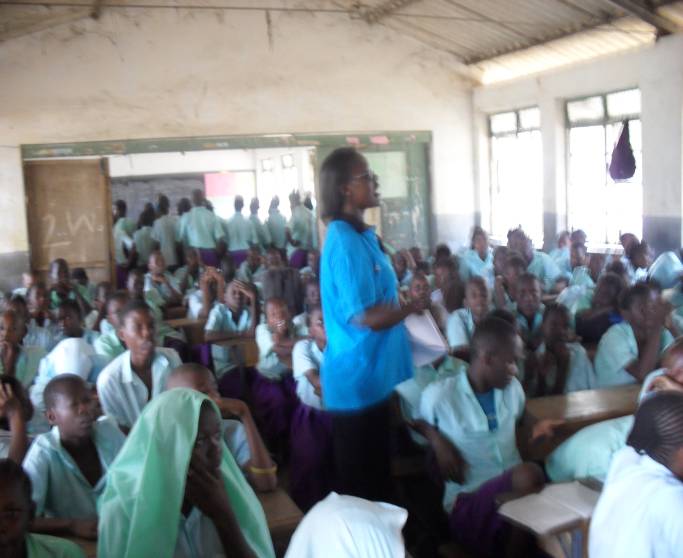
Pupils from Frere Town primary being taught on dangers of Gender based violence (GBV)
International Day for Action on Women’s Health
This activity took place on 28th May 2010. On this day, women are celebrated for their contributions to all areas of society, and recognized as the cornerstones of strong families and communities. The day was born in 1987 out of a meeting which was held in Costa Rica by Women’s Global Network for Reproductive Rights (WGNRR) to give women focused attention on their health needs since it is vital to ensure their sustainable progress across all areas of development. This year’s theme for the event was our bodies, our lives, and our health for the right to choose. It basically means that women should be made aware that they have the right and freedom to choose whatever they deem right for their bodies, lives hand health.
It was a worldwide initiative to spread awareness about the women’s unique and most important health needs, thereby making national governments to improve female healthcare, on this day women were supposed to be recognized and praised for their contribution to society and hence the significance to empowering women and championing their rights.
CWID believes that focused attention on their health needs is vital to ensure sustainable progress across all areas of development. CWID mobilized women to undergo HIV testing and counseling as one way of safeguarding their health and that of their children.
On this ground CWID partnered with ICRHK in providing Peer Educators and counselors for the VCT activities and basic treatment for STI. The bustle saw 53 people volunteering to be counseled and tested for HIV/AIDS.
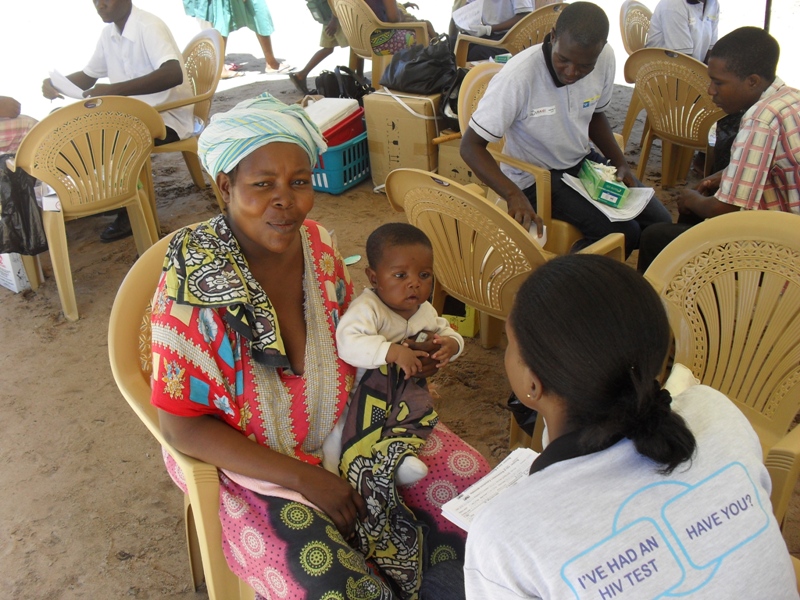
Mwanahamisi Said from Shirikisho Women Group pays attention to a counselor during the HIV/AIDS test on International Day for Action on Women's health
From our 2nd strategic objective which seeks to improve and empower women living at the grassroots level economically, CWID has been able to come up with a micro-credit programme that supports registered women groups of women living at the grassroots level. The women groups benefit from the soft loans which assist them in improving their small-scale business or micro-projects that earn them a living. Through this initiative we have been able to reduce poverty drastically among the marginalized women. In Mombasa, Kwale and Kilifi Counties we have been able to empower women who undertake small scale businesses. In Vitengeni we were also able to assist women with capital to purchase livestock and start businesses of goat rearing.
CWID has continued to capacity build the communities and creating awareness on the new constitution, the organization was instrumental in making sure that the new constitution was passed. It is through this tireless effort that the new constitution received a resounding over 70% support in Coast province during the voting at the referendum. The staff sensitized the community on the reforms that were highlighted on the draft constitution. They also enlightened on what reforms will be undertaken once the implementation process starts and gave the indicators on how the process of implementing the draft constitution will improve the governance and leadership of the country. We also sensitized women who are the majority of voters on the gains that waited them once the new constitution came into force.
Women’s gains in the Kenya’s Proposed Constitution were numerous. As the Kenyans geared up for referendum on the 2010 proposed constitution, Kenyan women were given an opportunity to understand the issues that directly affected them in the proposed constitution
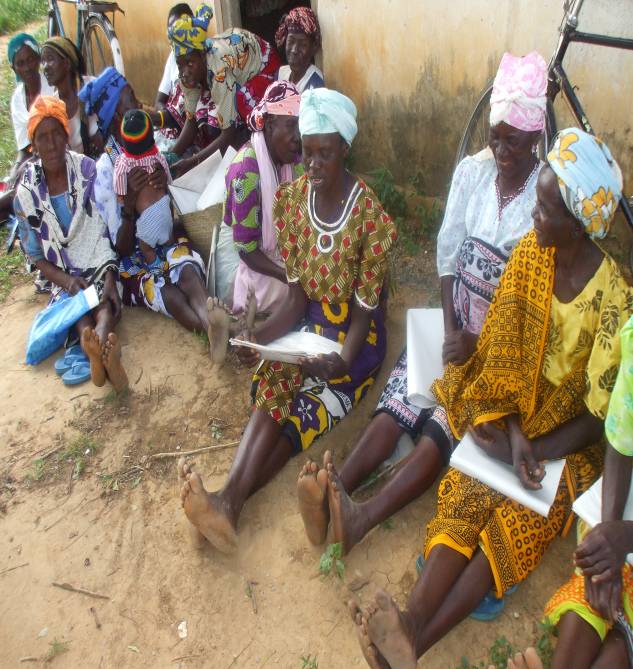
People with disability and TJRC Forum
During the post election violence we were partnered and worked with Action Aid in implementing the Truth Justice and Reconciliation process in areas at the Coast that people were most affected.
Truth Justice and Reconciliation Commission is a transitional justice mechanism established in situations where a country is emerging from a period of grave human rights atrocities and impunity and seeking to transit into a human rights state. It is geared to enable a state to commence the interrogation of systemic and massive human rights atrocities which if unchecked destroy a country’s ability to institute the fundamental elements of the rule of law necessary to the establishment and functioning of a democratic state. It allows a nation to acknowledge, confront and lay to rest those aspects of its past that are hindering it from moving on. This is a fairly new phenomenon, particularly in the emerging “new” democracies. Similar bodies have been set up in other countries including Argentina, Ghana, Liberia, Chile, Sierra Leone and South Africa.
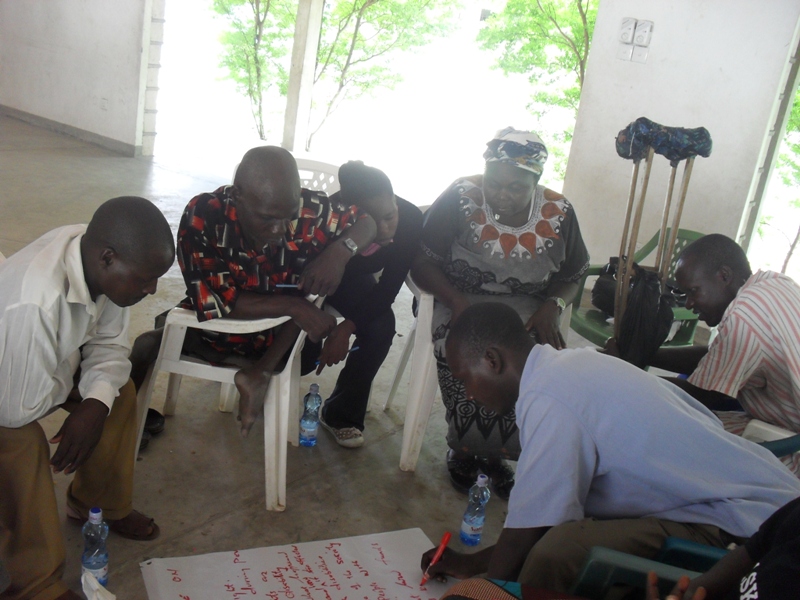
CWID in collaboration with Tunaweza disable women group and kind support from Action Aid Kenya organized forums for its PLWD in coast to be inducted on Truth Justice and Reconciliation process where PLWD sanitized on the work of TJRC and reasons why their cases should be heard.
The major concern was that the PLWD felt that their concerns were not adequately represented within the TJRC process.
Presentation on Child Tourism Prostitution in the Context of Development: in America
As part of our tireless work the organization through networking got an opportunity to do presentation to the Annual meeting of American Political Science Association (APSA) in Washington DC where our Programmes Director stunned the scholars with the evil that some tourists do in our coastal towns through her case study in Malindi Mombasa and Ukunda. The presentation titled The Sexual Exploitation of Children on the Kenyan Coast states “While tourism is the financial vigor of Kenyan economy, it is also the root course of child prostitution in Kenya, being the single largest source of foreign exchange; the sector brings home 780,000 foreign visitors that earns Kenya about USD 500 million hard currency annually. But the Influx as well is not helping the society but affecting the environment in spite of the growing concern that tourism is contributing to a host of child sexual abuses. “
The study stressed on how Coast Women In Development pressurized the Government to stop child tourism prostitution. Child tourism prostitution is hampered by the society which sees the vice as a means of earning a living; this is aggravated by high poverty levels. They believe that nothing takes a man out of poverty faster than a daughter who has a white man as a boyfriend. In this rationale the young girls are encouraged by none other than their parents and relatives to look for older white men who will not only pay the girl for her services, but her family as well
It also recognized that tourism officials admit that Kenya's role as a child sex destination has been downplayed for fear that it would undermine the crucial tourism industry that is already reeling from negative travel advisories from the US governments. Besides, Kenya's supremacy as the ultimate tourist destination in Africa is threatened by emerging destinations such as South Africa, Tanzania, Botswana and Namibia. Tourism is Kenya's third largest foreign exchange earner after tea and horticulture. (See a full annexed presentation from www.coastwomen.org).
Community and Members’ Capacity Building
One clear lesson CWID has learnt is that changes we hope for will never be achieved by CWID and its network members alone. We require concerted action by many players. There are also many other initiatives underway to build capacity among grassroots’ communities. The use of the word ‘we’ could therefore be understood to mean change agents in a collective sense, rather than CWID and its network members in particular.
As a result we hold regular workshops for collective capacity building.
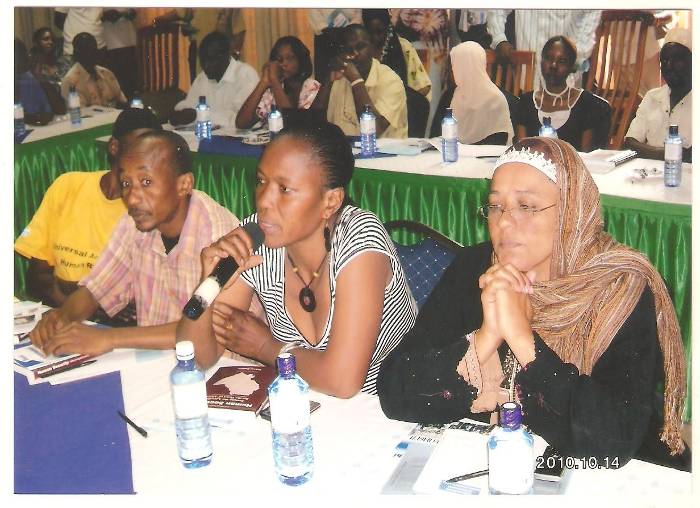
Participants during one of the many capacity building workshops undertaken by CWID and her Partners
Dissemination of Kenya AIDS Indicator Survey.
The organization partnered
with the Ministry of State for Planning, National Development and
Vision 2030 (National Coordination Agency for Population and
Development) in disseminating this survey report. The forum targeted
CBOs, FBOs and NGOs.
Through this forum we were able to build self esteem of participants
and also demystified some myths that were going on about HIV/AIDS.
Stigmatization and fear of VCT were also addressed.
The forum was also able to come up with way forward in addressing the challenges that continue in the spread of the HIV virus.
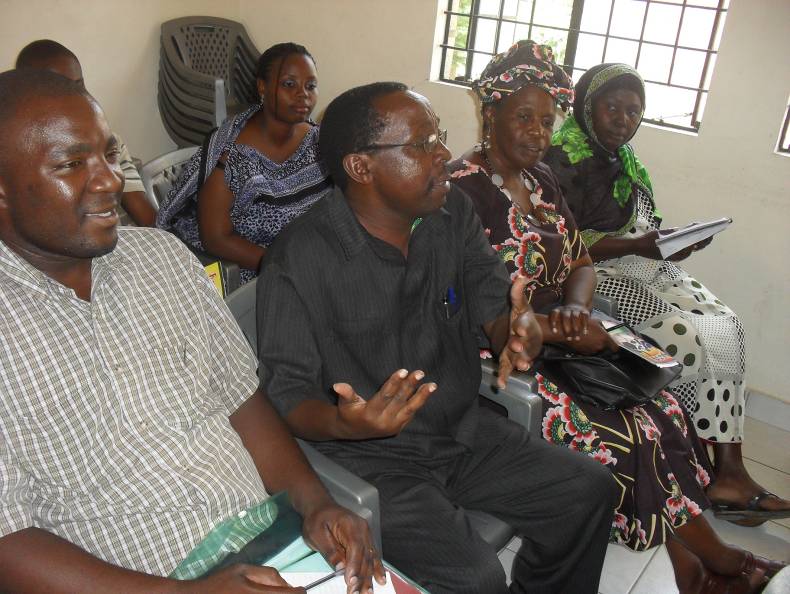
Former CACC chairperson contributes in the dissemination of KAIS Survey Report
Volunteers and Interns
In our work with the community and the volunteerism spirit, we also get volunteers both nationally and internationally. The volunteers/interns learn from our activities and offer their services to the organization. CWID has been able to achieve this through partnering with institutions like Minnesota University from USA, Mombasa Polytechnic and Advance Africa.
The volunteers we receive are always actively engaged in GBV prevention, facilitation, capacity building, women empowerment forums, social Justice Talks and HIV/AIDS prevention programs.
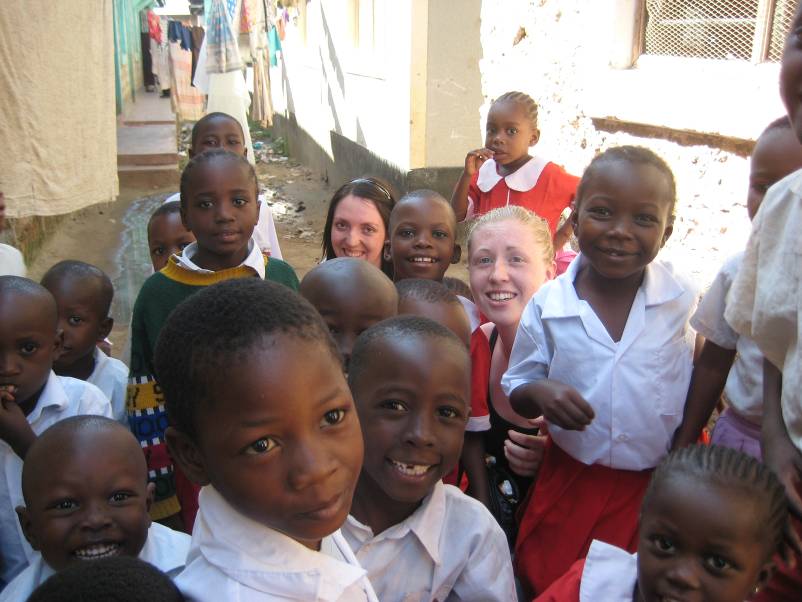 Interns
from Advance Africa Studies interacting with children in an orphanage
Interns
from Advance Africa Studies interacting with children in an orphanage
Empowering girl child education
Girl child education in Coast Province is a challenge as a result of the cultural practices including early marriages, stereotyped myths that if you educate a girl she will profit the community of her future husband and some religious beliefs.
CWID has been motivating and supporting the girl child education especially during their examination period annually. This is by providing them with examination materials and alternative food donation. It has resulted into improved grades from the institutions.
Last year, we visited St. Mary cliff Girls’ Primary School right before they sat their Kenya Certificate of Primary Education 2010 and had a chance to provide them with examination materials and food donations. This was a boost to the girls’ morale towards education and their improvement in the final examination was a clear indication that great milestones could be achieved in girl child education with a little inspirational support.
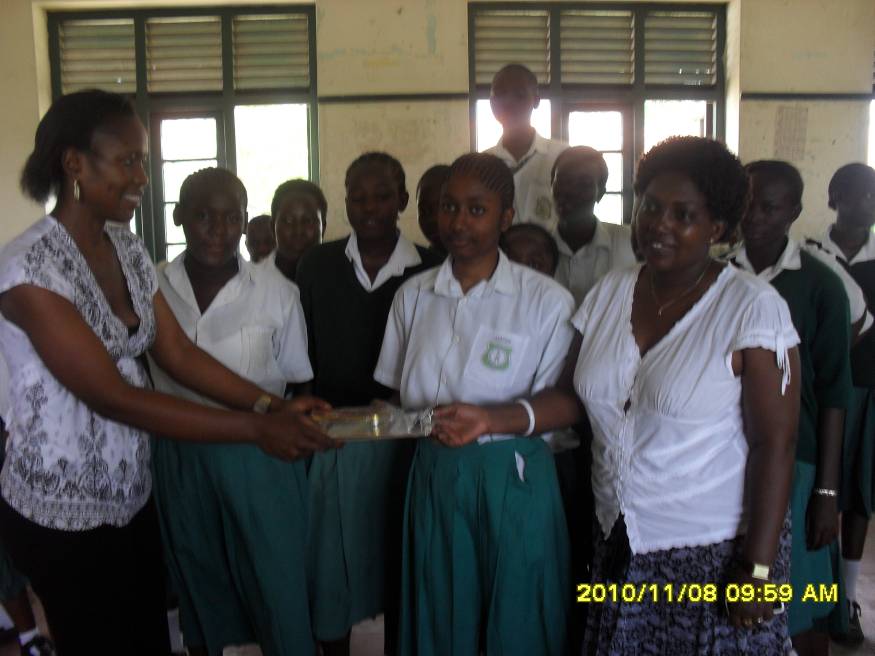
CWID’s Programme Director handing over examination materials to pupils of Mary-Cliff Girls Primary School
16 Days of Activism
‘16 Days of Activism’ is an activity that takes place every year. In collaboration with GBV Prevention network, we have been able to launch the 16 Days of Activism for the third time in a row.
The 16 Days of Activism 2010 was launched by Coast Women in Development at Kadongo Grounds. The event was marked with a reminder to respect women and children’s rights. The theme was localized to ‘Ushujaa ni kuthamini haki za watoto na wanawake’. This translates to ‘heroism is upholding the rights of children and women’. The event was graced by a procession from Lights-Kengeleni to Kadongo Grounds.
Women both at the grassroots level and at the workplace, with no legal system and policy which offers them protection against GBV were our main focus.
Prevention and awareness of gender-based violence and Human Rights was our main concern especially among the women.
Another major task of the 2010 campaign was the battle against child marriage which is a human rights violation with social, cultural and economic consequences including high rates of maternal mortality. This practice is rampant at the Coastal Province of Kenya.
Coast Women in Development has been in the forefront in the fight against gender based violence and economic demeaning. This has been done through collaboration with Pwani GBV network of which CWID is the Convener.
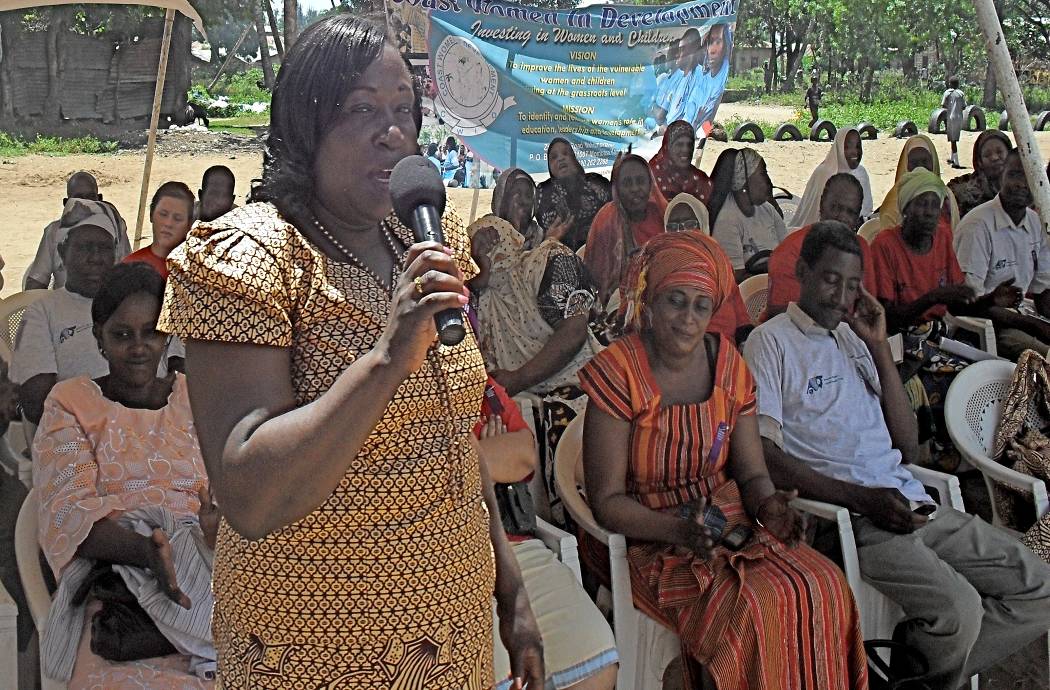
Community Outreach
Outreach is an effort by individuals in an organization or group to connect its ideas or practices to the efforts of other organizations, groups, specific audiences or the general public.
CWID as an organization has done several outreach programmes in communities around the coastal region including, Kilifi, Vitengeni, Mishomoroni just to mention a few. The programmes include prevention of gender based violence through trainings, TOTs (training of trainers), distribution of IEC materials, door-door campaigns and workshops.
The Outreach programmes have been very successful with support from other likeminded organizations through provision of materials, facilitators and development of messages.
The programmes have led to great achievements which include empowerment of the communities on their rights, access to information that wasn’t available before, knowledge on government facilities available to the public and other community services available at the local organizations.
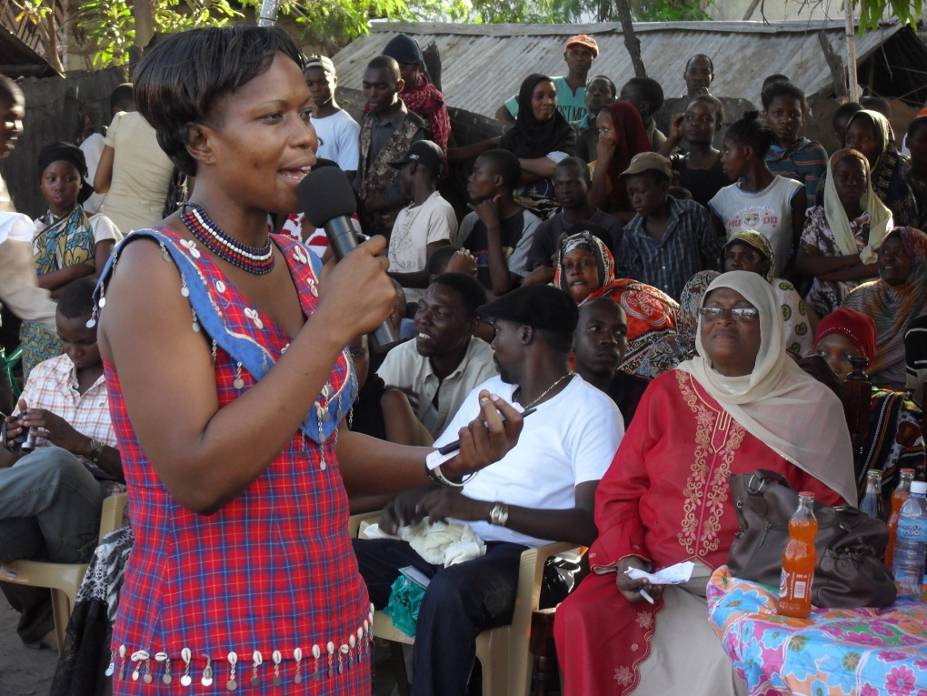
Training on governance and devolved government
Through partnership with Pwani Coalition for Good Governance, CWID was able to undertake capacity building training touching on the devolved government, leadership and integrity. This training was undertaken as part of awareness creation during the civic education on implementation of the new constitution.
The new constitution gives provision on equal rights of leadership to both genders. It has also increased channels of government funds trickling down to the common mwananchi. The vulnerable groups such as people living with disabilities who are actually exempted from taxing, orphans and widows now have a voice in their own country.
Lobbying and Advocacy
Residents of Moroto settlements that are near our offices were evicted from their homes. It was alleged that there was a court order released to evict the residents if they had not vacated the land by the given date. Some of the residents had lived there for their whole lives, so they had no other home apart from the slums.
The poor residents were traumatized when their houses were trampled down and around 300 families were left homeless. Amongst them were about 450 orphans and several widows who were being sheltered within this region. This was a major setback because the women and children were exposed to GBV.
Coast Women in Development in collaboration with other leaders and the former area councilor donated food and basic needs to these families and in following up the legal aspects of issuing of the land by sale to an area politician who was ruthless enough to send armed policemen and council Askaris on the vulnerable women and children. We were able to mobilize the communities to institute a private prosecution in court. The case is still in court.
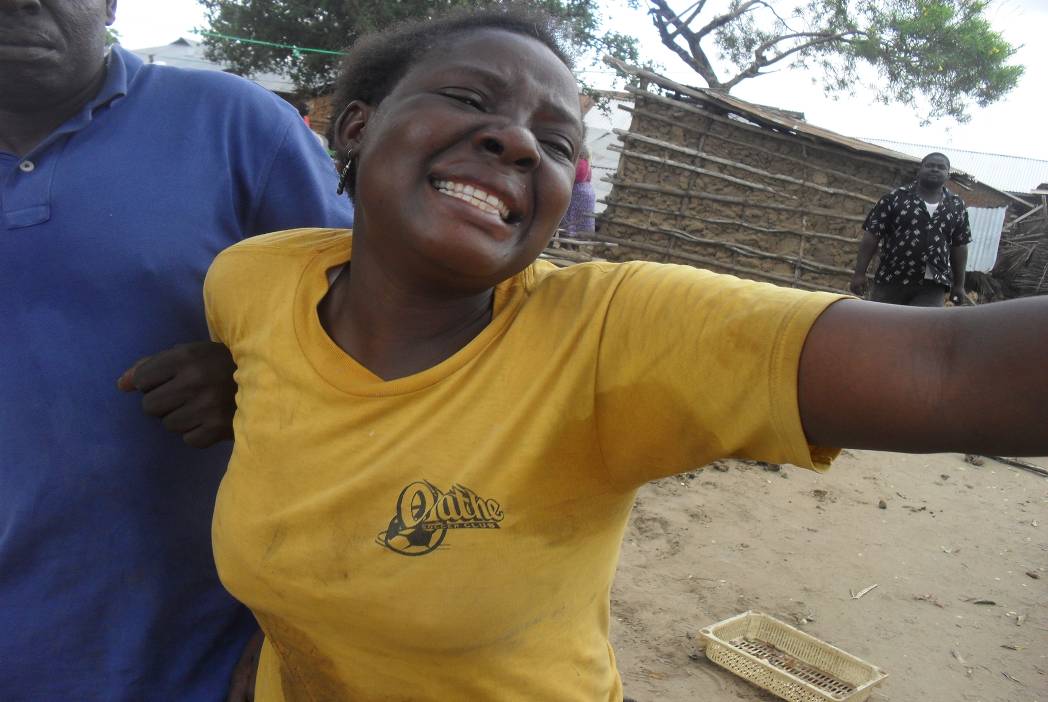
Media Engagement Campaign
In its human rights and civil rights campaign, CWID has been able to forge a mutual working relationship with members of the media fraternity. Through close working relation the organization has been able to highlight malpractices within the society while at the same time creating awareness to the general populace on issues to do with GBV and other forms of violations. A clear example was when the organization was able to highlight through the media the situation which had one private developer exhuming the dead bodies from the grave and leaving them around. As an organization we felt that this was not only a health hazard but also disrespect to the dead.
CWID has also successfully worked hand in hand with the media to advocate for the rights of women and children and also to enlighten the public on some of her activities. CWID has been on live talk shows in the local media stations creating awareness on the women’s rights.
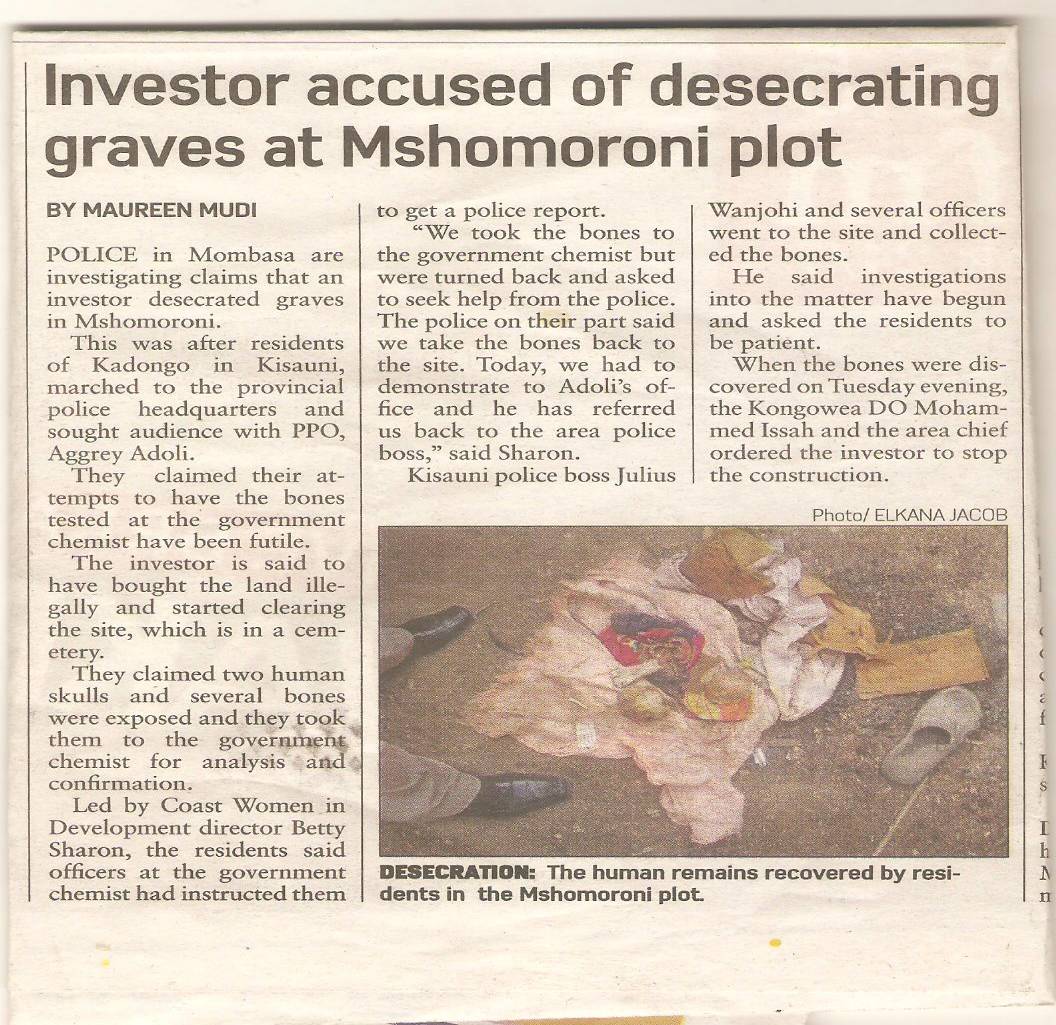

Goat-rearing project
The women living in Vitengeni, Kilifi have started a goat-rearing project that was initiated by CWID.
The project has been an idea that was focusing on how to reduce the level of poverty and then empower them economically of women living in Kilifi. This will also be a stepping stone for them to support themselves and also generate income and employment from the project. This will transfer to their economic improvement and mind opener. This project of goat rearing was undertaken through collaboration of the area councilor Mr. Teddy Mwambire , the government officers from the Ministry of Livestock and the community of Vitengeni as a whole.
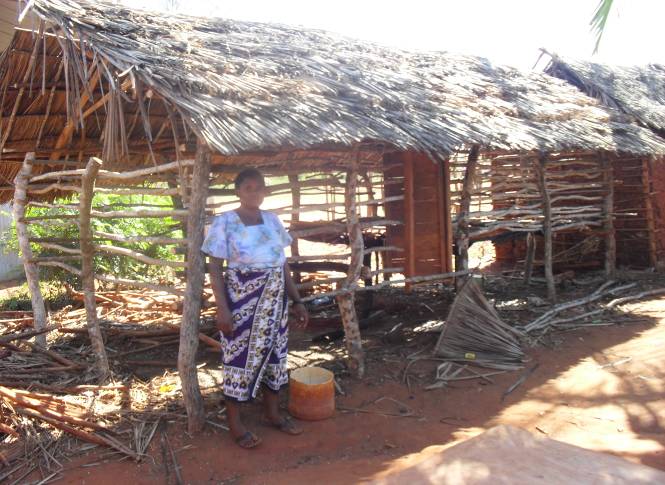
Increased opportunities for women leadership in the new constitution
We have been holding public forums that enlighten women at the grassroots level of the increased opportunities they have on leadership in the new constitution. The new constitution provides for more leadership slots such as the requirement that in every seating there should be at least a two-thirds representation of one gender. There are 47 seats left specifically for women in parliament. Another thing is that there will be a female youth and female person living with disability both representatives at the parliament.
International Women’s Day
This event is usually celebrated on the 8th March every year. International Women's Day is a global day celebrating the economic, political and social achievements of women past, present and future. In some places like China, Russia, Vietnam and Bulgaria, International Women's Day is a national holiday.
CWID participated in the event with other stakeholders and also enlightened on the need for improved reproductive health and also sensitization on recess procedures from the women seeking health services in Mombasa County. The theme for the year was “Equal access to education, training and science and technology: Pathway to decent work for women” the 100th Anniversary celebration was held in Makadara grounds and brought together over a thousand women from all walks of life.
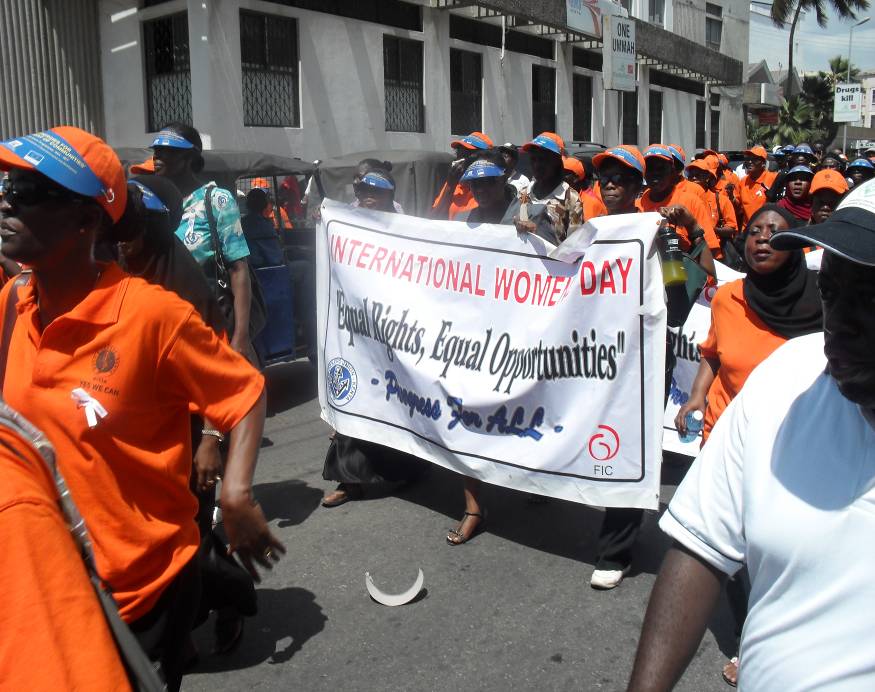
Peaceful demonstration on escalating fuel and food prices
Inline with the escalating prices of essential commodities and fuel at large, CWID got involved in playing part in peaceful demonstration that was announced nation wide with other civil society organizations at Uhuru gardens to make it clear to the government to decisively take action in response to the rising prices of essential commodities. We held a peaceful demonstration to the Provisional Commissioner’s (PC) office so as to present a memo.
The Key objectives of this activity were:
To present the suffering of the mwananchi and what they are facing all around the nation and lobby for reduction in fuel and the essential commodities.
To sustain the program on achieving cause of action as planned
To mobilize many stakeholders in action.
To assist individuals understand how to hold demonstration for the remaining days for achievement of action.
Staff members from CWID who were actively involved, highlighted that responsibility and suffering was not only for the members present carrying out the demonstrations but for all the citizens, urging individuals and other stakeholders to hold hands together and make the benefits be shared equally. In addition to that, members were reminded to not only delegate responsibilities of mobilizing other citizens to join, instead join in reaching out to others too so as to address the need and demand faced by citizens.
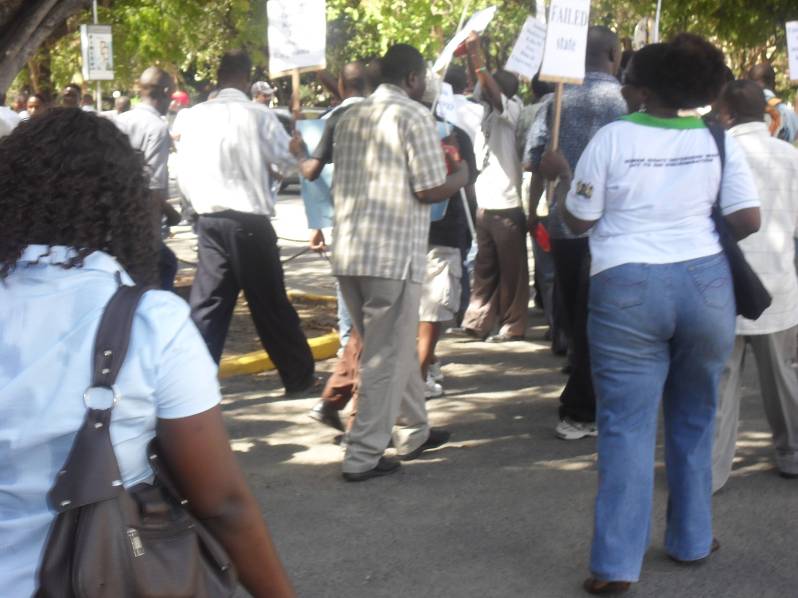
Success
One of the greatest achievements was when the organization was recognized by the committee of experts and handed a certificate for their splendid job of creating awareness and building capacities of the mwananchi. Through consistent involvement in the struggle for equality, civil liberties and human rights, CWID celebrated its success when the new constitutional dispensation came into force on 27th August 2010 after successful referendum on 4th August 2010. In this reporting period CWID feels proud that major issues that touch on women rights are now embedded in the constitution. Our long struggle has now borne fruits.
It thus came as no surprise when the organization was awarded the best civil society of the year by MUHURI Muslims for Human Rights and UN for Human Rights Kenya, during the commemoration of International Human Rights Day (IHRD) held on 10th December 2010 at Mama Ngina Drive. This proves that the community appreciates and acknowledges our efforts.
It climaxed our advocacy struggle for the last 5years of existence, which included vigorous advocacy and empowerment to the grassroots. This was very encouraging, showing that our work was being recognized by the community. This was despite the fact that we have limited resources since getting financial resources from the donor is a challenge to the young organization working at thegrassrootslevel.
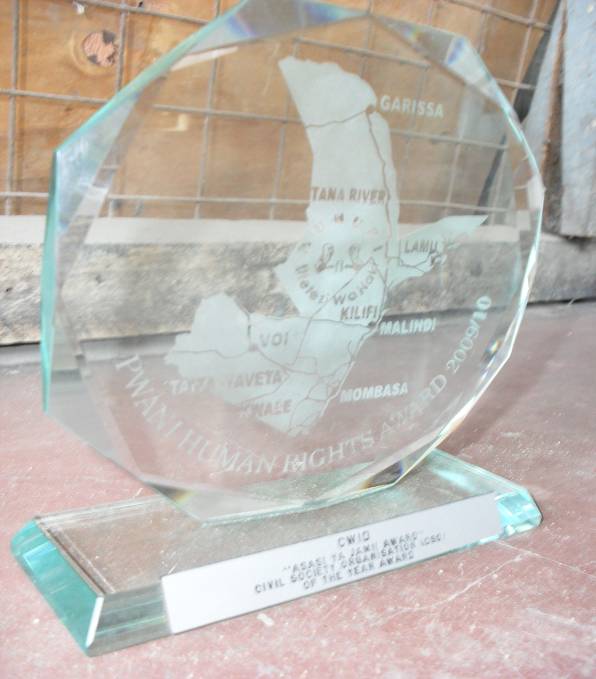
The following are other achievements:
CWID has been selected to be a secretariat of Pwani GBV network where different local organizations, Faith Based Organizations, National and International NGOs have teamed up in collaboration with the National Gender Commission Office. The network is a platform to reduce GBV cases at the Coastal region. The network succeeded in launching the 16 Days Campaign against GBV and through networking, the community knows how to keep forensic evidence and many cases are now being reported.
The microcredit program project has empowered many households in Mombasa, Kilifi and Kwale counties where members are ale to sustain children in schools. This program has also empowered the grassroots women economically and improved their living standards.
Acceptance from community which has meant a lot to CWID because it depicts that the society recognizes the importance of CWID and appreciates its existence.
Improved capacity building which has in turn improved provision of services to the community through various trainings of staff and networking.
Networking- working together with other institutions through pooling of resources and hence producing best services to the community.
Expansion of democratic space in last 5 years by empowering the society and giving them a voice
Collaboration with some government institutions / government – CSO – private sector partnership has improved due to sharing same goal and sometimes even objectives.
Changes in behavior and attitude in the community which has seen people coming out and reporting GBV cases without fear of repercussions.
Community organization / formation of self-help groups.
Utilization of devolved funds by communities / CDF tender allocation through open forums organized by CWID and other stakeholders.
Challenges
The major constraint that continues to bite is inadequate funds that make it difficult in undertaking our mandate as an organization.
Inadequate resources to employ more staff and participate in important workshops and trainings on women and children issues that go on globally is another issue.
CWID also lacks enough resources to expand the Micro Finance project to cater for more poor women and children.
We have tried to mitigate by tapping in the services of volunteers to assist in implementation of organizations activities.
The deep rooted harmful cultural practices have a huge challenge in championing for the women’s rights especially at the grassroots level where most women are not educated.
The women are therefore attached to their traditions which mostly violate their fundamental human rights.
Part of these is the early marriage, forced prostitution; sexual violence and gender violence which are some of the violence practices that still control our lives in the coastal region of Kenya.
The poor infrastructure and terrain has made the areas that we are supposed to reach impassable thus restraining us from undertaking our duties.
Other challenges include:
Societal fatigue due to rapid and continuous forums that sometime do not provide the expected results or change to the community directly.
Apathy from the community members who have resigned their fate and surrendered their will to manipulations of the government.
Capacity of mobilization in rural areas especially in the informal settlement areas is limited
High / unrealistic expectations from communities.
Dependency syndromes in communities where community members always ask for handouts and food each time we go to capacitate them on their rights.
Government lack of co-operation with CSOs whom they continue to view as inciters instead of collaborators.
High poverty rate among the communities.
In order for CWID to have a smooth running of its programmes, the organization highly depends on the corporate alliances, colleagues, individual support, members’ subscription fee and volunteerism.
Special thanks go to Wyndham International, Committee of Experts Kenya, National Coordination Agency for Population and Development (NCAPD), African Women Development Fund, Action Aid, Pwani Oil, CWID’s members, Milly Glasses, Catholic for Peace and Justice (otsuni)- Italy and all other partnering organizations and networks for their continued and invaluable support and strong networking throughout this period without their support it would not have been easy to move this make all these changes. WE also depend on philanthropists like Maria Charva from Spain who has constantly assisted on the microcredit project and girl child education
CWID depends on strong networks, community involvement, and training sessions with other partnering organizations and also gets involved in their activities and projects that liaise with our objectives too sequentially to achieve our goals.
“If the first woman God ever made was strong to turn the world upside down all alone, these women together ought to be able to turn it back, and get it right side up again”
- Sojourner Truth